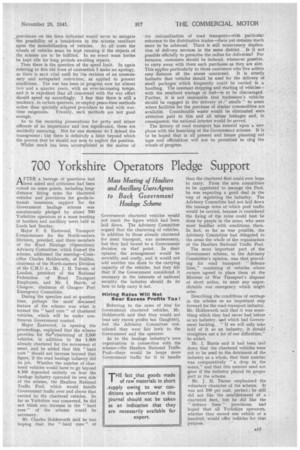700 Yorkshire Operators Pledge Support
Page 35

If you've noticed an error in this article please click here to report it so we can fix it.
AFTER a barrage of questions had been asked and criticisms had been voiced on some points, including longdistance hiring rates for chartered vehicles and provisions for goods-intransit insurance, support for the Government haulage scheme was unanimously pledged by about 700 Yorkshire operators at a mass meeting of hauliers and ancillary users held in Leeds last Sunday,
• Major F. S. Eastwood, Transport Commissioner for the North-eastern Division, presided, and three members of the Road Haulage (Operations) Advisory Committee, which framed the scheme, addressed the meeting—Councillor Charles Holdsworth, of Halifax, chairman of the North-eastern Division of the C.M.U.A., Mr. J. H. Turner, of London, president of the National Federation of Road Transport Employers, and Mr. I. Barrie, of Glasgow, chairman of Glasgow Port Emergency Committee.
During the speeches and at question time, perhaps the most' discussed feature of the scheme was what is termed the " hard core " of chartered vehicles, , which will be under continuous Government control.
Major Eastwood, in opening the proceedings, explained that the scheme provides for the° chartering of 2,600 vehicles, in addition to the 1,600 already chartered for the movement of meat, and he added that this "hard core " should not increase beyond that figure, if the road haulage industry did its job. Whether the number of chartered vehicles would have to go beyond 4,100 depended entirely on how the haulage industry operated its own side of the scheme, the Hauliers National Traffic Pool, which would handle Government traffic over and above that carried by the chartered vehicles. So far as Yorkshire was concerned, he did not think any increase in the "hard core " of the scheme would be necessary.
Mr. Charles Holdsworth said he was hoping that the " hard core " of Government chartered vehicles would not reach the figure which had been laid down. The Advisory Committee argued that the chartering of vehicles, in addition to those already chartered for meat transport, was unnecessary, but they had bowed to a Government decision on that point. In their opinion the arrangement would be unwieldy and costly, and it would not add another ton more to the carrying capacity of the vehicles, but they felt that if the Government considered it necessary in the interests of national security the industry should do its best to help carry it out.
Hiring Rates Will Not Bear Excess Profits Tax!
Referring to the rates of hire for Government chartered vehicles, Mr. Holdsworth said that they would not bear any excess profits tax (laughter), but the Advisory Committee considered they were fair both to the Government and the operator.
As to the haulage industry's own organization in connection with the scheme—the Hauliers National Traffic Pool—there would be heaps more Government traffic for it to handle than the chartered fleet could ever hope to carry. From the area committees to be appointed to manage the Pool, he was expecting a good deal in the way of regulating the industry. The Advisory Committee had not laid down the tonnage rates at'which pool traffic would be carried, because it considered the fixing of the rates could best he done by people in the areas, who were most familiar with conditions there.
In fact, so far as was possible, the Advisory Committee had delegated to the areas the whole of the organization of the Hauliers National Traffic Pool. The most important part of the Government scheme, in the Advisory Committee's opinion, was that provid ing for road transport " defence lines," consisting of vehicles whose owners agreed to place them at the Minister of War Transport's disposal at short notice, to meet any unpredictable war emergency which might arise.
Describing the conditions of carriage in the scheme as an important step forward for the road-transport industry.
Mr. Holdsworth said that it was something which they had never had before as an industry, aatd which had Government backing. " H we will only take hold of it as an industry, it should straighten out a lot of our difficulties," he added.
Mr. I. Barrie said it had been laid down that the chartered vehicles were not to be used to the detriment of the industry as a whole, that their number was comparatively " a drop in the ocean," and that this number need not grow if the industry played its proper part in the scheme.
Mr. J. H. Turner emphasized the voluntary character of the scheme. It was not 100 per cent. perfect ; he still did not like the establishment of a • chartered fleet, hut he did like the " defence lines" provisions, and hoped that all Yorkshire operators, whether they owned one vehicle or a hundred, would offer vehicles for that purpose.




















































